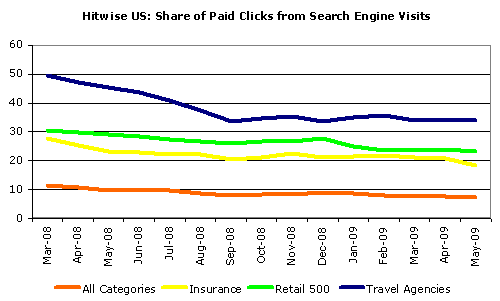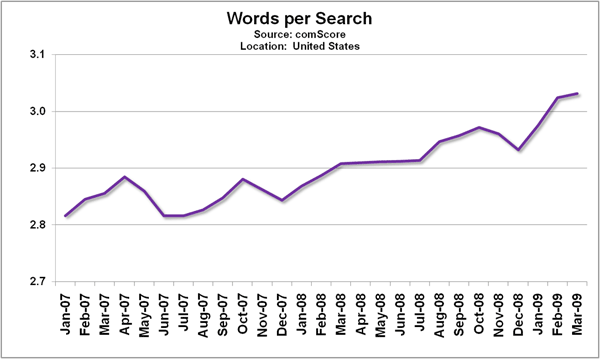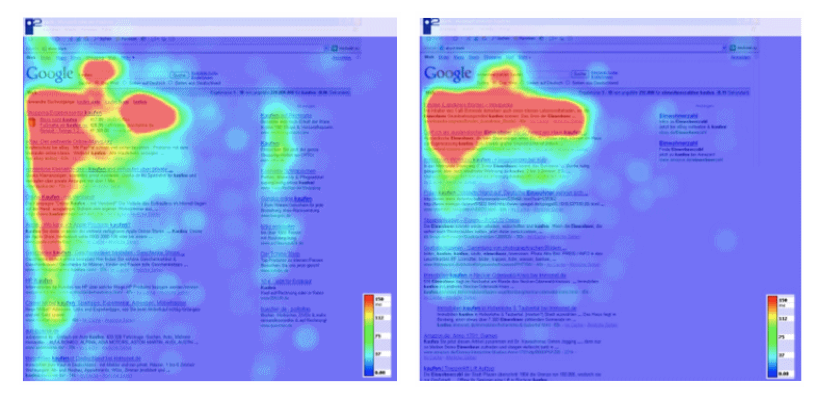The latest from Hitwise and Comscore show that the growth in paid search is slowing.
In the four weeks to May 9, 2009, 7.25% of search engine traffic to All Categories of websites was from paid clicks. This compares to 9.84% in the same four week period in 2008 – representing a 26% decline in the share of paid clicks.

According to Comscore query volume grew 68% in the last two years while paid clicks grew only 18%. Now, lets be clear, paid clicks aren’t going down, they’re just not growing as fast.
There are a lot of theories about why paid search is sputtering. Here’s my analysis of five reasons behind the slow down.
Advertiser Decline
One theory is that the economy has forced many advertisers to abandon paid search. This is a compelling theory given the number of bankruptcies and marketing budget cuts.
Yet, nearly every survey (here, here and here) is showing that the economy has pushed more dollars online. And those online dollars were going to search – a medium giving advertisers far more control and, more importantly, providing a clear return on investment through analytics.
Search has become a near necessity these days and as the leader in search Google’s AdWords is a default part of many a marketing mix. Yet, the Google Tax has been going up.
The Google Tax? Anyone who has been advertising for more than three years can remember ten cent CPCs. CPC inflation was and still is a considerable problem. Yet we were all like frogs in a pot. The heat was turned up so slowly we didn’t really notice … until now.
Budget cutting forced companies to audit campaigns and what they found might have surprised them. The water was scalding hot!
Verdict: Probable.
Words per Query Up
The number of words per query are up and continue to rise. Many surmise that the increase in query length is directly related to less advertising coverage and fewer paid clicks. This theory presupposes that most advertisers are running sophisticated campaigns on exact match and are heavily using negative keywords.
My experience is that sophisticated campaigns are still infrequent. Most have broad match and phrase match full bore. But, for the moment, lets say this is the case for larger advertisers. That leaves all of the other advertisers who are presented with an AdWords interface that encourages broad match.
Though there is some data that shows coverage is down, I’m unsure it is related to the number of words per query. The number of broad match and phrase match advertisers simply seems too great for query length – particularly of such a small magnitude – to have had an appreciable impact.

The graph is striking because of the scale. But it still amounts to a mere single digit percentage increase in words per query over two years.
Verdict: Unlikely.
Quality Score Suppression
Google has been using their Quality Score to ensure that relevant ads are presented for user queries. If Google determines your ad and landing page aren’t relevant you’ll be forced to pay more for the ad to be displayed.
The Quality Score isn’t always a reflection of reality. It is heavily influenced by the CPC your ad receives and overall account performance. Poor keyword research, account structure, copy writing and negative keywords could lead advertisers to pay more even though they have quality content.
Google’s implementation of Quality Score has weeded out poorly targeted ads. It has also increased the CPC for all advertisers. In this way, Quality Score may be contributing to the decline not through suppression but through making the Google Tax cost prohibitive.
Verdict: Possibly.
Better SEO
Search Engine Optimization (SEO) has improved. More and more sites have invested in SEO and have come to see it as a legitimate marketing strategy. ‘Why pay for it when you can get it for free?’ And that goes double when the economy hits the skids.
Search engines have also gotten better at SEO through algorithm tweaks and results presentation changes. From Yahoo’s SearchMonkey to Google’s Universal Search (local, video etc.), organic search results have become much more compelling.
What about Google’s Vince Change? The change to Google’s trust and authority algorithm resulted in top brands floating to the top of more search engine results. Could users be finding brands more often in organic search instead of clicking on branded ads?
Improving organic search has always been an odd balancing act for Google. Better search results improve retention and return rates. That means more ad impressions which should logically mean more paid clicks. But could organic search become too good and suppress paid clicks?
Verdict: Likely.
Mix-Shift of Queries
My own theory revolves around the mix of queries. What are people searching for and has that changed over time?
Look at the words per query graph again. What about those drops in December? Could commerce based queries be less diverse? We’ve already seen differences in transactional (left) versus informational (right) searches.

In tough economic times could the shift in searches be away from transactional or product searches? Instead, are people searching for information or (low cost) entertainment online? Those areas may have less advertising coverage than traditional product queries.
As CPM rates have declined and CPCs have increased the ability for content based sites to participate in paid search may have dwindled. The economics just don’t work out nearly as often as they used to.
Is this not also reflected in the Hitwise numbers? Travel, insurance and retail are getting fewer paid clicks. Travel in particular seems transparent. In a recession fewer people are taking vacations leading to fewer paid clicks. In addition, travel agencies may pull back on paid search as a result of decreased demand.
And what about search refinements. Earlier this year I wrote about a Yahoo! study on how users were refining their queries.
Could users be refining their queries more frequently with a greater understanding that refinement will lead to better results? If so, I’d hazard that refined queries likely have a lesser chance of garnering a paid click. These users are highly focused on the organic results to determine if their refinement was successful. This dovetails nicely with the informational search eye tracking study above.
Verdict: Probable.
Hodge Podge

In the end I’d bet it’s a little bit of everything mentioned with a dash of the unknown thrown in for good measure.
How, why and what people search coupled with the failing economy and an online advertising model in flux is going to have an impact on paid search.
Search, as a business, is still rather young. We’re all trying to learn what makes it tick and how it’s going to grow in the future.
This is what draws me to online marketing and search specifically. The answers aren’t black and white and the territory is uncharted.
And with that, what are your thoughts? What do you think of my analysis? Why do you think paid search growth is declining?
The Next Post: Google Suggests Ads
The Previous Post: Google + Microformats = Rich Snippets

1 trackbacks/pingbacks
Comments About 5 Reasons Why Paid Search Is Down
// 4 comments so far.
Internet Strategist@GrowMap // May 23rd 2009
There are two major reasons advertising – and specifically AdWords spending – is going down and will keep going down unless the ppc engines reform their practices.
1) Expanded broad match makes the ppc ads being displayed LESS relevant – FAR less relevant! Google continues to ruin high converting phrases by pushing those who actually sell the items targeted off the page by forcing them to outbid generic ads. When the clicks are no longer profitable this is not economically viable. The original broad match worked well; expanded broad match does not and now even phrase match is dangerous.
2) PPC Engines and especially Google have strangled the life out of their Golden Goose by feathering their nests at the expense of their advertisers. Where I once recommended every small business run highly targeted ppc ads indefinitely and charged $100 an hour to manage those campaigns, today I do NO ppc work because I can not protect those same small businesses from rampant dishonesty: distribution fraud, traffic that will never convert, artificially driving bid prices up at critical times (such as the holiday shopping season), displaying ads for generic searches and on parked domains.
It is highly likely that Google will use the data in Google Analytics to drive bid prices up on converting phrases whenever their stock price needs a boost. I have explained all of these issues more clearly in a blog post called We Miss the Golden Days of PPC Circa 2003.
They also love to shuffle the organic results during the holiday season. (See another of my most popular blog posts “Why You Can NOT Rely Solely on Organic Traffic. I have linked it to this comment to make it easy to locate. I hope you don’t mind.
Both of the posts I mention in this comment stay continually in the Most Popular section in the right sidebar of my blog – for good reason!
P.S. I found you because @MikeTek recommended you for #followfriday at Twitter. Now that I know where you are I’ll be adding links to your blog to related posts and sharing your work at Twitter, FriendFeed and cliKball.
aj // June 02nd 2009
The expanded broad match change was absolutely a turning point.
At the time, I was running a very long-tail PPC program (1MM+ keywords) and suddenly those highly targeted keywords were overtaken by less relevant keywords. I argued that it was clearly not in the best interest of the user, but short-term revenue maximization seemed the goal at the time.
It would be very interesting to see Google roll back that change. It would solve the problem you mention regarding smaller businesses seeking to use Google to drive ROI positive traffic. In essence, the Google Tax has simply become too high for many to afford.
I don’t think Google will use Analytics data directly but there are other ways they can gather information to inform both the algorithm and bid prices.
The holiday season is a bit of a mystery. Clearly there is increased demand during this time which would naturally increase the CPC. The problem is that there is no transparency (I pine for the old Overture days).
So we don’t know if there is subtle price manipulation going on or not. I’ve encountered a few instances that make me think there is – but have later found resolution or helped to uncover bugs within the pricing mechanism.
Bottom line, PPC is a much different animal than in was in 2003. It is far less profitable and is usually successful for those who really understand and actively manage their own programs.
Internet Strategist // June 03rd 2009
Even before expanded broad match Google was monitoring long-tail keyword phrases and periodically matching them to a more generic equivalent. It seemed to be quarterly. Each quarter more phrases were affected.
This was very obvious for a Gazebo manufacturer whose account I managed. One by one their specific keyword phrases were targeted by those bidding on broad match. They made some unusual shapes (rectangular, oval) and we targeted many long-tail phrases (cedar, pine, etc.).
Where they originally could buy clicks for under $0.25 a click eventually they would have had to bid $1.00+ to get anything on the front page. Worse, if you really wanted an oval gazebo all you see are ads for companies that don’t actually sell them so you can’t find one.
I saw this in other accounts. New phrases that had never been used are very profitable for a while – until Google adds them to the generic phrase and targets broad match ads at them.
I will disagree on Google using analytics data. They already increase bids during the holidays, especially on holiday related products. If they’ll do that why wouldn’t they raise bids artificially on keyword phrases they know are converting?
I can guarantee you that they are indeed inflating the bid prices during the holidays as I verified it in numerous AdWords accounts. Until about a year ago I had all the ppc work I could handle at $100/hr cash in advance. I worked primarily with tiny ($100-$500 /mo spend) to very small businesses (Up to $10,000/mo spend).
Some of those businesses were holiday-centric. Their keywords were running at bids under $1.00 a click until right after Thanksgiving. Prices did not go up gradually as they would if humans were raising their bids or even if bid management programs were bidding keywords up (reacting to other bids).
As an example, they might go from $0.75 to $5.00+ in one day. Some keyword phrases we had no competition on would stop displaying until we bid $5.00 and a few would not show up even at a $20 bid for a $24 item. (I just wanted to see if they would – no profit in bidding like that.)
Then they all dropped back down several days before the last day you could ship products without paying for expedited shipping. No businesses would actually drop their bids BEFORE the end of regular shipping – and most would be too busy to be adjusting their bids then.
Matt Cutts even admitted that Google set minimum bids. I sure wish I had saved that one link or a copy of that page. I’ve wanted it several times including when I wrote that ppc post.
I no longer accept money for managing ppc accounts because I do not have the resources to build the system I believe it would take to adequately protect advertisers from the ppc engines. That would require using something like ClickTracks (now Lyris) to monitor ROI and a Bid Management program to immediately stop spending.
Even that might not work because Google once showed the most expensive ads close to the ad groups you paused so there is no guarantee they wouldn’t do that again. During that time the more you tried to tighten spending the more it would spiral out of control while ROI crashed (because the ads shown cost more and since they were landing on the wrong pages they converted poorly).
I do a little advising here and there and dabble with exact match only for one blog we have. I am hoping that my new favorite search engine DuckDuckGo will catch on and add ppc. I’m putting them in touch with the people who were behind the original GoTo / Overture.
The post I did on Organic Search included posts from ProBlogger showing drops in their search placement three times – all three just before the holidays. Many believe that when they paused their AdWords their organic listings dropped. I haven’t seen anyone actually post proof; however, it certainly would NOT surprise me.
aj // June 13th 2009
You’re right about the minimum bids. Google clearly does have some sort of minimum bid that they set on a keyword basis. For Google this does two things, scares off the bad actors (affiliate squatters etc.) but also ensures that they’re optimizing revenue on each term.
I remember when the broad match change occurred and minimum bids suddenly went up. It actually felt like a science experiment. They prompted you to up your bid to another level to make the term active. When you did it would then prompt you to up it even further to make it active.
At the time, we took one Ad Group and behaved like rats and upped our bids until they were active. For another we simply refused to budge. In time, say one week, the Ad Group we didn’t boost bids on returned to an active state.
We were told that the tiered bid structure we encountered was a glitch. I’m not sure if it was or not, but even if it was, they had results of a price elasticity test on a wide range of keywords.
I would also assume that the minimum bid does change on a seasonal basis. I doubt that it’s arbitrary, but is instead likely a data model based on prior years advertising behavior.
Lets face it, many advertisers went into PPC with the insane desire to be number one on the term, without really looking at the ROI. A flood of unthinking advertisers, or brand advertisers who didn’t need ROI, helped propel CPC inflation.
If what you say about the shipping window is true, then Google has done some manual keying that will adjust the minimum bids based on demand. I don’t really blame Google for this. They should get a bit more during the holiday season when everyone else is making bank. But I’d like Google to say they adjust bids seasonally and they are currently, IMO, pricing too many out of the game. The Google Tax is just too high.
The Analytics data is just not part of the equation in my opinion. They have other ways to get correlated data. CTR rates. Percentage of clicks that return to the SERP. Historic data from the PPA program. Aggregate benchmark data (given willingly) via Google Analytics.
So we agree that Google tracks effectiveness and uses it as a way to influence bid prices, but disagree on how they collect that data.
The impact of Organic Search and AdWords has always been intriguing but – like you – I’ve seen no proof.
In talking to folks at Google I think they certainly are committed to the best Organic experience but are also savvy business people. I don’t ascribe malice to their efforts. They’re looking to make money just like any other business. (I mean, why hasn’t Amazon told us how many Kindles have been sold?!)
The problem lay in the lack of transparency and the mantra of ‘Don’t Be Evil’. I like Danny Sullivan’s request to be rid of the bid black box – and go back to the old Overture style transparency. I think that would go a long way to repairing trust and push CPCs down to a level where both sides win.
Sorry, comments for this entry are closed at this time.
You can follow any responses to this entry via its RSS comments feed.